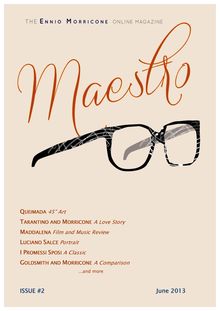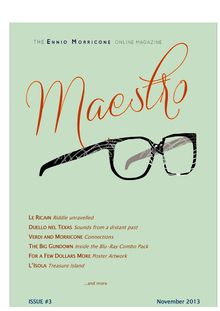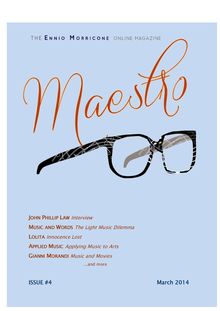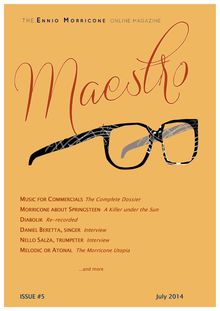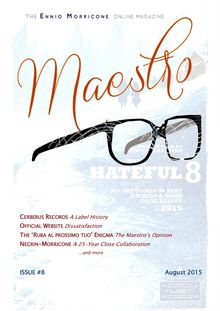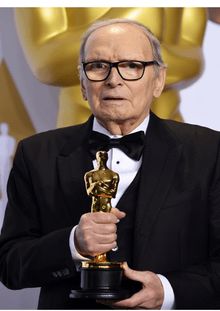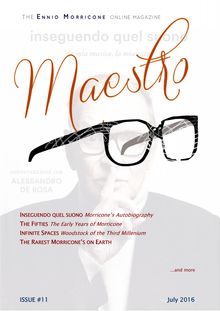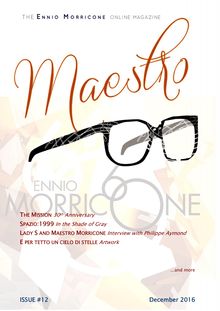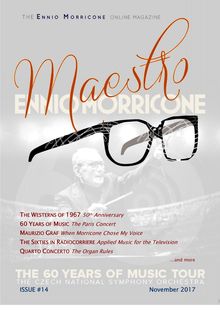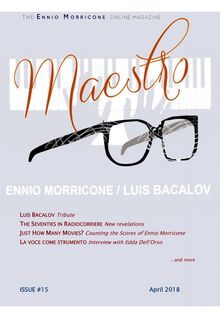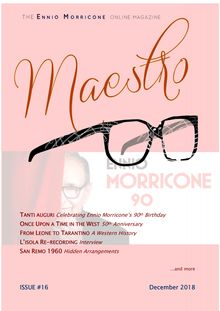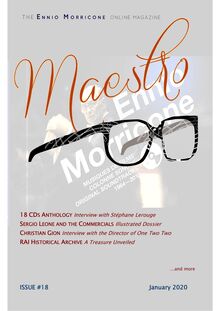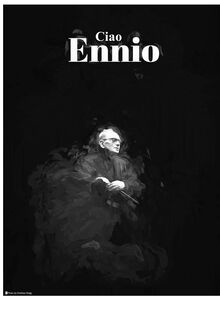Maestro, the Ennio Morricone Online Magazine, Issue #11 - July 2016 64 pages Maestro, the Ennio Morricone Online Magazine, Issue #11 - July 2016
66
pages
English
Documents
2017
Le téléchargement nécessite un accès à la bibliothèque YouScribe Tout savoir sur nos offres
66
pages
English
Documents
2017
Le téléchargement nécessite un accès à la bibliothèque YouScribe Tout savoir sur nos offres
Publié par
Publié le
04 janvier 2017
Nombre de lectures
19
Licence :
Langue
English
Poids de l'ouvrage
3 Mo
Publié par
Publié le
04 janvier 2017
Nombre de lectures
19
Licence :
Langue
English
Poids de l'ouvrage
3 Mo
INSEGUENDO QUEL SUONO Morricones Autobiography
THE FIFTIES The Early Years of Morricone
INFINITE SPACES Woodstock of the Third Millenium
THE RAREST MORRICONE S ON EARTH
...and more
ISSUE #11 July 2016MAESTRO – THE ENNIO MORRICONE ONLINE MAGAZINE ISSUE #11 JULY 2016
Table of Contents
Preface: My Favourite Composer .............................................................................................. 3
In breve....................................................................... 5
Old News.. 11
Additions to Previous Issues .................................................................... 19
Inseguendo quel suono (Pursuing that Sound): Ennio Morricone’s Autobiography ............... 20
The Fifties: The Early Years of Ennio Morricone................................... 28
Backstage with Ennio Morricone: From the DVD Bonus of En mai fais ce qu’il te plaît....... 38
Infinite Spaces: Woodstock of the Third Millennium.............................................................. 43
Variations on a Theme: Are e-Store Playlists a Qualitative Ranking? .................................... 46
Negrin-Morricone, A 25-Year Close Collaboration, Part 3: Famiglia e guerra (2007-2012).. 52
The Rarest Morricone’s on Earth ............................................................................................. 58
License for all articles: CreativeCommons
Cette œuvre est mise à disposition selon les termes de la Licence Creative Commons Attribution
- Pas d’Utilisation Commerciale - Partage dans les Mêmes Conditions 2.0 Belgique
PUBLICATION PÉRIODIQUE D'ÉTUDE ET DE CRITIQUE DANS LE DOMAINE ARTISTIQUE. LES TEXTES
SONT PUBLIÉS SOUS LA RESPONSABILITÉ DE LEURS AUTEURS, QUI EN CONSERVENT LA PROPRIÉTÉ
DES DROITS D'AUTEUR ET INTELLECTUELS.
All the articles are of purely informative nature. We do not own the copyright of the images
included in this document or of the audio clips accessible from it. All the rights on the images
and the music are the property of their respective owners.
Chief editors: Patrick Bouster and Didier Thunus
Front cover design: Valeria Magyar
Front cover inlay: Anne-Catherine Mortiaux
Front cover and back cover pictures taken from the book “Inseguendo quel suono”,
Mondadori editionsMAESTRO – THE ENNIO MORRICONE ONLINE MAGAZINE ISSUE #11 JULY 2016
P REFACE
My Favourite Composer
Mozart, Beethoven, Schubert: that s who Im talking about
by Didier Thunus
At the Golden Globe ceremony this year, when Quentin Tarantino came on stage to take the
prize on behalf of Ennio Morricone, he said that the Maestro was his favourite composer, and
added: “When I say ‘favourite composer’, I don’t mean movie composer – that ghetto – I’m
talking about Mozart, Beethoven, Schubert. That’s who I’m talking about.”
Apart from his unfortunate use of the term “ghetto”, which uselessly diverted from the essence of his
message, there was some debate about how could someone possibly prefer a film composer over the
masters of classical music. It is so much anchored in everyone’s conviction that the best composers ever
can only be the likes of Mozart and Beethoven – and of course they are – that such a statement was
considered blasphemy, or at best the hasty opinion of an ignorant.
But that’s not the point. When someone tells about what s/he prefers, like Tarantino did that night, s/he
inevitably expresses a subjective opinion. And when subjectivity comes into play, s/he is the only one
entitled to pronounce a judgment. It is solely a matter of personal taste. How can someone say that he is
wrong?
Sure enough, Ennio Morricone is my favourite composer too. And I am also talking about the same
league as Tarantino was. Let me put it bluntly: I don’t like classical music. Too polished, too perfect for
my taste. I like it better when it upsets, when it hurts, when the weaknesses of the composer can be felt
even behind a faultless execution. I do have some inclination towards the likes of Stravinsky or
Pendericki, or anyone who had enough cheek to make the music burst out into the ears of the listener.
Of course I am able to recognize the perfection in the works of Mozart, and I would be the first one to
admit that without Beethoven or Strauss, music would not be today what it has become. I should actually
say that I do like classical music, because I like so much what my favourite composers have inherited
from it. I find it interesting to listen to classical music, but more from the point of view of the history of
arts, because I find it important to understand that the techniques of counterpoint were brought to
perfection by Bach, or that Vivaldi played an essential role in the orchestral forms that gave birth to
what is known as ‘classical music’. But this is purely for curiosity or educational purposes, it has nothing
to do with personal taste. When it comes to my personal feelings towards music, I can assert that, even
though I dig Jules Massenet’s Thaïs and even though I immensely enjoy Jean-Philippe Rameau’s Les
Indes galantes, classical music or ‘cultured’ music in general has never succeeded in moving me just a
fraction of what film music has been able to, more specifically the one of Ennio Morricone (and of a
selected few others). So, yes, most definitely, Ennio Morricone is my favourite composer, compared to
any other composer that exists or has existed. And no intelligentsia of sorts can tell me that I am wrong:
of course I am right! And there’s nothing to be ashamed of – on the contrary, I am very proud of having
given priority to my own deepest predilections.
Ennio Morricone’s reaction to Tarantino’s statement was quite funny actually. Saying that the director
was going over the top because he is a kind person, he then added: “We'll have to wait two centuries to
say what he said.” So he didn’t say that Tarantino was wrong. He said that he could be right but we
don’t know yet. And the funniest in all this is that he said this while still sounding modest! I think this
is brilliant.
So now you can go ahead and read this fanzine dedicated to (most likely) your favourite composer, and
not have any second thought about the pertinence of spending time reading this, as opposed to some
erudite accounts about the works of the masters. At least we have made our best to make it a reading
3MAESTRO – THE ENNIO MORRICONE ONLINE MAGAZINE ISSUE #11 JULY 2016
experience which you will not regret. We have decided to dedicate many pages to the book
“Inseguimento quel suono”, because we believe it is a major opus, finally a publication about Ennio
Morricone deserving the name of reference book. You will find in this issue a description of the book
and of what you can expect to find in it, an exclusive interview with its author Alessandro De Rosa, and
a dossier that was triggered by reading the first chapter of the book, about the works of Morricone during
the Fifties – a first topic which the book allowed us to explore in more depth.
There will be as usual a lot of news, old and new. You will also find a transcription of the “Backstage”
bonus of the DVD of En mai fais ce qu’il te plaît and a description of the Infinite Spaces project.
There will be an article about searches in internet e-stores, and one about very rare Morricone albums.
And finally, you will find the concluding part of the triptych about the collaboration between Ennio
Morricone and Alberto Negrin.
A total of 10 people contributed to this issue: a record worth noting because without those benevolent
souls, this webzine would be reduced to its simplest expression.
4MAESTRO – THE ENNIO MORRICONE ONLINE MAGAZINE ISSUE #11 JULY 2016
N EWS
by Didier Thunus (D.T.), Patrick Bouster (P.B.), Richard Bechet (R.B.), Frédéric Durand (F.D.),
Bob Hendrikx (B.H.), Milan Zivancevic (M.Z.) and Nicola Schittone (N.S.)
In breve
Awards and Nominations
Back to normal life for Ennio and Maria after the media storm around The Hateful Eight and
its multiple awards. An Italian magazine spotted this great image of Ennio doing some shopping
just a few days after coming back to Rome end of February (see image on previous page). “The
composer maintains the usual simple habits, with the constant support of his wife Maria”, says
the newspaper.
There was yet another nomination for the Maestro in the meantime, at the David de Donatello
2016 for his score to Tornatore’s Corrispondenza. Ennio lost to David Lang’s (indeed
splendid) score to Sorrentino’s Youth. Morricone was not nominated for the Nastri d’Argento
this time, and the award went to Carlo Virzì for La pazza gioia.
N.S., D.T.
Concerts
Because of problems with his spinal column, Ennio was not able to perform his May concerts.
The Paris concerts are now scheduled for September, whereas the ones at the Accademia Santa
Cecilia in Rome have been cancelled.
He could resume his planned dates as from
midJune, and a few new dates were added in the
meantime, for 2017 already: Prague, Krakow and
Vienna in February, Zürich, Munich and
Mannheim in March.
M.Z., D.T.
New Books
Inseguendo quel suono
A book presented as Ennio Morricone’s
autobiography and called “Inseguimento quel
suono – La mia musica, la mia vita” was released
thon the 26 of April 2016 by Mondadori. Ennio
invites us on the cover image to be quiet in order to
leave all the space to the mu
